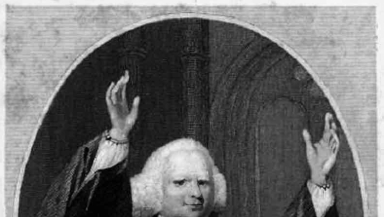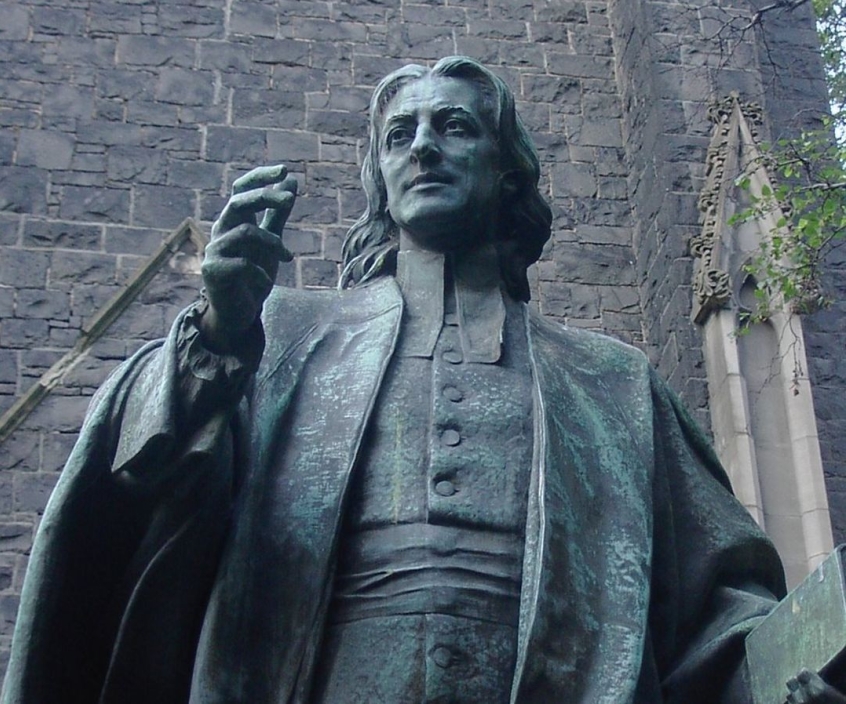
Evangelical is one of those words with quite a few different meanings. Its root is the New Testament Greek word for Gospel – evangel, meaning good news – so literally or etymologically an evangelical is a Gospel Christian. In one sense, then, all Christians are evangelical, since all believe in the Gospel, the good news of Jesus Christ. But etymology can only get you so far in understanding the meaning of words, and especially words that signify a particular group of people with a particular history. To get to the bottom of this, then, you have to look at what the word means in context and how it has been used.
Another meaning of evangelical is the one coined by Martin Luther in the Reformation. Luther would often use the term to refer to his church reform movement, and the Lutheran churches in Germany still bear the name today. This is closer to the meaning we're looking for. But evangelical in our sense originated not in 16<sup>th century Germany but in 18<sup>th century England and its American colonies – places where Calvin and not Luther was typically the Reformer of choice.
Evangelical in our sense traces its origins to the great religious revival of the 1730s, what is known as the Great Awakening in America, and more prosaically as the evangelical revival over here. At the centre of this were the preaching ministries of Massachusetts preacher Jonathan Edwards, Gloucester-born evangelist George Whitefield, and future founder of Methodism John Wesley.
What did they preach? They preached the Gospel – which in a Christendom context of cradle Christians was often a radical move. To people who had grown up thinking they were Christian but didn't necessarily attend church often or engage much on a personal level, they preached the fundamental importance of every individual experiencing for themselves a personal conversion to Jesus Christ through a deep and genuine repentance. This repentance was understood as a response to understanding the meaning and power of Christ's atoning work on the cross. Such a message found a ready audience in both colonial America and post-Restoration England, and many thousands came to hear these men speak and discovered for themselves through their words a lively new faith.
Evangelical historian David Bebbington has set out four marks that have over the past three centuries consistently distinguished evangelicalism from other Christian traditions, such as the High Church and Broad Church traditions. They are, first, its conversionism or commitment to converting people to Christ; second, its activism, especially in evangelism but also in social engagement; third, its crucicentrism, or focus on the cross and the atoning work of Christ as the central doctrine of Christianity; and fourth its Biblicism or commitment to the authority of the Bible and its central role in Christian preaching and piety.
So we find William Marsh in 1850 defining an 'evangelical believer' as 'a man who believes in the fall and its consequences, in the recovery and its fruits, in the personal application of the recovery by the power of the Spirit of God, and then the Christian will aim, desire, endeavour, by example, by exertion, by influence, and by prayer to promote the great salvation of which he himself is a happy partaker.'
READ MORE: 'The world is now my parish' - the remarkable legacy of George Whitefield
Referring to the Bible, John Wesley in the 18<sup>th century said: 'Let me be a man of one book.' Famed evangelical Bishop of Liverpool J C Ryle declared in the late 19<sup>th century that the first leading principle of evangelical religion is 'the absolute supremacy it assigns to Holy Scripture.'
Ryle's stress here on the supremacy of scripture was in part a response to the emergence of theological liberalism during the 19<sup>th century, and especially from the 1860s as biblical criticism went mainstream in the English-speaking churches. Evangelicals resisted the liberal and critical movement on the whole, insisting instead on the divine inspiration and supreme authority of Holy Scripture, a characteristic that survives to this day.
The cross has always been at the centre of evangelical religion. In 1891, for example, leading Anglo-Catholic churchman Charles Gore began to argue that the Incarnation should be understood as the centre of Christian theology.
Methodists, however, were warned not to lose sight of the centrality of the cross: 'Give to the death of Christ its true place in your own experience and in your Christian work – as a witness to the real and profound evil of sin, as an overwhelming manifestation of Divine love, as the ground of acceptance with God, as a pattern of sacrifice to disturb us when life is too easy, to inspire and console us when life is hard, and as the only effectual appeal to the general heart of men, and, above all, as the Atonement for our sins.'
Conversion, likewise, has consistently sat at the core of what it means to be evangelical. Originally, in the 18<sup>th century all evangelical preachers were expected to have undergone a conversion experience themselves so that they could speak with authority about what they knew. The conversion of early Methodist preacher Sampson Staniforth – then a solider on active service – evinces the basic ingredients of the conversion experience:
'As soon as I was alone, I kneeled down, and determined not to rise, but to continue crying and wrestling with God, till he had mercy on me. How long I was in that agony I cannot tell; but as I looked up to heaven I saw the clouds open exceeding bright, and I saw Jesus hanging on the cross. At the same moment these words were applied to my heart, 'Thy sins are forgiven thee'. My chains fell of; my heart was free. All guilt was gone, and my soul was filled with unutterable peace.'
Conversion did not necessarily start from a place of complete unbelief. People who already regarded themselves as Christian would often experience it, some of them already ordained! The essence of evangelical conversion was not necessarily new belief but a fresh insight into the reality of salvation and one's true standing before God. It was a stark recognition of one's sinfulness before God, and a personal acceptance of God's forgiveness, which had been bought through Christ's atoning sacrifice on the cross. This repentance was to be accompanied by a deliberate reorientation of life inspired by gratitude for Christ's sacrifice and the forgiveness it brings. John Wesley spoke of a person's 'sure confidence, that by the merits of Christ he was reconciled to the favour of God.'

Conversion wasn't always held to be the work of a moment. Evangelicals sometimes recognised that conversion could be a gradual experience, as when Jonathan Edwards noted that 'in some it seems to be very discernible when the very time was; but others are more at a loss.' Anglican Evangelicals in particular were open to gradualism, with leading 19<sup>th century evangelical Anglican Charles Simeon explaining: 'We require nothing sudden.'
Methodists, Baptists and Evangelicals from other churches, however, typically looked for a moment of crisis.
The evangelical commitment to personal conversion occasioned much controversy throughout the 19<sup>th century, particularly in the Church of England where it wasn't clear how compatible it was with the Prayer Book teaching on infant baptism as the moment of regeneration. Was it about a hope for the future? Or was 'regeneration' different to becoming a Christian? This was the route taken by J B Sumner, the first Evangelical Archbishop of Canterbury in 1848, while legendary Baptist evangelical preacher Charles Spurgeon excoriated Anglican evangelicals in 1864 for refusing to repudiate the doctrine of baptismal regeneration. This ignited a storm of controversy at the time, conducted largely through pamphlets - the blogs and tweets of the Victorians.
The most celebrated case in this controversy was the 1847 refusal by Bishop Henry Phillpotts of Exeter, a High Churchman, to institute evangelical cleric George Gorham to a living because Gorham did not accept the Prayer Book teaching that baptism is the moment when a person is born again. After four years and an appeal all the way to the Judicial Committee of the Privy Council, Gorham's right to reject the doctrine of baptismal regeneration was upheld. But that did not put an end to the conflicts by any means, and the tension for Anglican evangelicals between a belief in personal conversion and the C of E Prayer Book doctrine of regeneration at baptism remains to this day.
READ MORE: In Their Words: The Story of Early Methodism
The necessity of conversion flowed naturally for evangelicals into a stress on evangelism and then further into social activism. So it was that evangelicals founded the great majority of the 19<sup>th century missionary societies that took the Gospel to the far-flung corners of the globe.
The evangelical life could be exhausting. One lay person in 1774 described his and his wife's Sunday thus: 'We will attend the preaching at 5 o'clock in the morning; at eight, go to the prayer meeting; at ten, to the public worship at the Foundery; hear Mr Perry at Cripplegate, at two; be at the preaching at the Foundery, at five; meet with the general society, at six; meet in the united bands at seven, and again be at the prayer meeting at eight; and then come home to...' sit down and watch TV with a pint of beer?
No, '...to read and pray by ourselves.'
Phew! I don't know about you but that's not quite what my Sunday looks like.
The clergy were no less tireless than the laity. Spencer Thornton, Rector of Wendover, in 1840 delivered every week seven evening lectures, gave two afternoon readings and conducted four Bible classes. On top of this, he held five monthly and three quarterly meetings. Wesleyan ministers in the 19<sup>th century were expected to work 90-100 hours every week – no wonder the Methodists maintained a 'Worn-Out Ministers' Fund'!
It wasn't just that natural activists were drawn to the evangelical banner. Prominent Scottish evangelical leader Thomas Chalmers was reputed to have visited 11,000 homes in his Glasgow parish in a single year. But before his evangelical conversion he wrote that 'a minister may enjoy five days in the week of uninterrupted leisure'. Conversion to the evangelical religion made a big difference for many in their priorities and how they lived their lives.
As one commentator in 1879 explained: 'The evangelical saint of to-day is not a man who spends his nights and days in fasting and prayer, but a man who is a zealous Sunday-school teacher, holds missions services among the poor, and attends innumerable committee meetings. 'Work' has taken its place side by side with prayer.'
The Methodists put a special emphasis on the ministry of lay people alongside the ordained, and this spilled over into other evangelical contexts including in the Church of England, where paid parish workers became commonplace in evangelical parishes.
The influence of Evangelical activism spilled out well beyond the evangelical sphere, helping define the prevailing attitudes of the whole era. The parish cleric, for example, in the 18<sup>th century typically behaved much like a member of the landed gentry, with his 'five days of uninterrupted leisure'. Yet in the 19<sup>th century the model pioneered by evangelicals of the parish cleric as an active and engaged pastor and preacher became the norm in all churches as public expectations of the clergy rose.

In other spheres, too, the 'Victorian values' we have come to identify with the era – social engagement, hard work, sobriety, chastity and so on – were in large part a product of evangelical activism and zeal contributing to changing attitudes and raised expectations throughout society.
Indeed, it's worth remarking that for much of its history, beginning in the 18<sup>th century and throughout much of the 19<sup>th century, evangelicalism was well-aligned with its era's notions of progress and improvement. In many cases it was leading the way, as with its untiring opposition to the slave trade, its raising the bar on sexual propriety, especially for men, and its numerous efforts in the area of public health.
John Wesley in the 1770s was clear where he stood on slavery, setting the pattern for evangelicals in the following decades to bring pressure to bear on government to end the slave trade and slavery in British dominions.
'Liberty,' Wesley declared, 'is the right of every human creature, as soon as he breathes the vital air. And no human law can deprive him of that right, which he derives from the law of nature. If therefore you have any regard to justice, (to say nothing of mercy, nor of the revealed law of GOD) render unto all their due. Give liberty to whom liberty is due, that is to every child of man, to every partaker of human nature. Let none serve you but by his own act and deed, by his own voluntary choice. Away with all whips, all chains, all compulsion! Be gentle towards men. And see that you invariably do unto every one, as you would he should do unto you.'
William Wilberforce, Lord Shaftesbury and Josephine Butler were among the many evangelical figures working in the social and political arenas throughout the 19<sup>th century to improve society on Christian lines.
By the turn of the 20<sup>th century, however, the power and appeal of evangelicalism in the political and social sphere had waned considerably and it found itself increasingly out of favour with the cultural and political elites. Modern secular ideologies such as Marxism and secular liberalism were in the ascendancy, opposing evangelical Christianity and all religion because they were 'superstitious', and because they were too easy on the rich and too hard on the sexually adventurous, and for lots of other reasons.
By the end of the Second World War, radically atheistic philosophies like existentialism and revolutionary socialism were all the rage, and come the 1960s the societies which had once embraced evangelical ideals as progress and the future now threw them off as a kind of tyranny.
The results of this social and cultural revolution are still working themselves out, including within the churches where evangelical and other wings attached to traditional readings of scripture are often at loggerheads with progressive and liberal wings wanting to move with the times and embrace new ways of reading scripture.
Yet in some ways, churches are more evangelical than they've ever been. Evangelicalism went mainstream within the Church of England in the second half of the 20<sup>th century, so that by the mid-1980s over half of clergy in training identified as evangelical. The fruit of this can be seen, for instance, in the strong emphasis on mission and evangelism that now permeates the Church of England's strategies and response to decline, as well as in the commitment to creedal orthodoxy of today's bishops and clergy in terms of belief in the incarnation, salvation in Christ, miracles, the Virgin Birth and so on. These could not have been taken for granted as they are today a generation or two ago.
So what does the future hold for evangelicalism? The signs I confess are hard to read. Certainly the wider culture has shifted markedly away from its Christian moorings in recent decades, and hostility to Christian faith can be strong, especially in its more conservative forms; indifference to religion is also endemic. Ongoing decline seems to be inevitable for a while yet at least.
But might there in the purposes of God be being laid somewhere in all this hostility, indifference and decline the foundations of a new revival? Can we hear, however faintly, the rumblings of a spiritual yearning amongst people to reconnect with their Creator? It's hard to tell. But whatever the future holds, there is still plenty of life in evangelicalism yet. Whatever the future of the church looks like, you can be sure evangelicals will be there, in the thick of it, contending energetically for the Gospel of our Lord.
Dr Will Jones is a Leamington-based writer, a mathematics graduate with a PhD in political philosophy and a diploma in biblical and theological studies. He blogs at www.faith-and-politics.com and is author of Evangelical Social Theology: Past and Present (Grove, 2017). He can be found on Twitter @faithnpolitic













